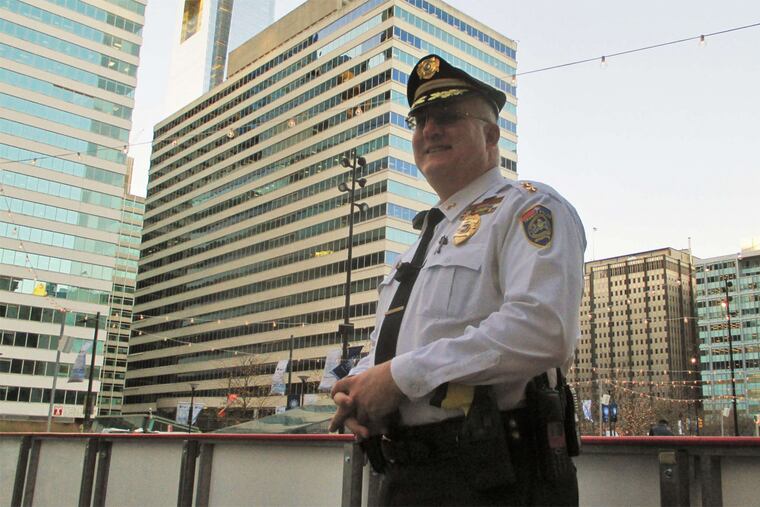SEPTA police chief Nestel adds social-media savvy to traditional policing
It's a little before 6 o'clock at 18th and Walnut, and traffic is stopped during the Friday evening rush hour as a handcuffed protester is being placed inside a police wagon. "Get your effin' hands off me, you effin' pig," were the words that sparked the arrest when a scheduled march of 60 anti-racist-war/anti-racist-cop protesters under close Philadelphia police surveillance attempted to turn east on Walnut at 19th Street into oncoming traffic.

It's a little before 6 o'clock at 18th and Walnut, and traffic is stopped during the Friday evening rush hour as a handcuffed protester is being placed inside a police wagon. "Get your effin' hands off me, you effin' pig," were the words that sparked the arrest when a scheduled march of 60 anti-racist-war/anti-racist-cop protesters under close Philadelphia police surveillance attempted to turn east on Walnut at 19th Street into oncoming traffic.
Capt. Stephen Glenn of the Civil Affairs Unit had raised his hands in front of the lead marchers to prevent them from walking in the street and guide them toward the sidewalk on the south side of Rittenhouse Square when the first cry of police brutality went up after a protester ignored Glenn's warning and was taken into custody.
"Film the cops! Film the cops!" protesters chanted at passersby, some of whom had pulled out their cellphones to capture the moment on video. Time stood still for a second or two. The protesters were squeezed between the police and possibly frightened or agitated homeward-bound motorists. The moment trembled with possibilities, most of them bad.
A female protester and others stood within two feet of police officers' faces and repeatedly called them "pigs," "murderers," "cowards," "racist," and "idiots." That last prompted one onlooker to shout, "Takes one to know one!" She muttered "idiots" as she walked past me on the sidewalk.
The lead protesters, one carrying an upside-down American flag, seemed agitated at their inability to provoke the police. "Put your phones down and stop filming! Join us on the streets!" they shouted at pedestrians who were clearly sympathetic to the police. The march remained peaceful, and 15 minutes later it ended back where it started, on the west side of City Hall.
"Could you have imagined this 30 years ago?" said SEPTA police chief Thomas J. Nestel III, who had trailed the march from start to finish, keeping in radio contact with SEPTA dispatchers to detour as many as 15 bus routes, depending on which way the marchers turned on streets in Center City. It's fair to say that Philadelphia police would have reacted differently three decades ago.
"They would have been arrested the minute they stepped in the street and blocked traffic," one veteran cop told me.
Nestel also kept in constant touch with a growing number of citizens who follow his tweets (@tnestel3), advising them of possible delays and the nature of the protesters and the police response. He tweeted real-time photos of the marchers' progress and stops during the 75-minute protest.
His sense of humor was evident the entire time. "Maybe this is just a defense mechanism," he tweeted during the confrontation, "but whenever I hear 'Cops are pigs,' I think of a BBQ pork sandwich."
At 6-foot-5 and 280 pounds, Nestel looked like an iceberg among rowboats as the ever-changing formation of protesters and uniformed and plainclothes police shifted with each turn onto a new street. Later, during a ride on the el to District One headquarters at 69th Street, Nestel's frame could barely fit inside the open passenger doorway as he peered left and right at each stop, looking for possible problems.
Nestel calls police work "the family business." His grandfather was a Philadelphia cop. His father was deputy police commissioner. "At one time there were 12 of us, counting uncles and cousins, who were working in law enforcement at the same time," he said. And a lot of them, he added, wouldn't like the new direction of policing, which is leaning away from a focus of locking up the bad guys after a crime to crime prevention.
Still, Nestel tells nephews considering police work that it's the best job in the world. "Where else can you meet different people every day in different situations and have a chance to help someone," he says with genuine enthusiasm.
His embrace of social media, what he calls "electronic community policing," is an example. He invites interaction with citizens with his tweets and responses. Since he joined Twitter in the summer of 2012, he's met at least 100 people he might not have just working the street. Public defender Mike Lovell told me about Nestel's willingness to engage all kinds of people to promote transparency in what has been traditionally a closed-lipped and proudly clannish community.
Nestel has gone so far as to offer civilians review copies of a policy draft SEPTA is developing for the use of body-worn cameras by 189 transit police that is scheduled to begin Jan 1. Nestel wore one of the tiny, barely noticeable cameras clipped to his tie during the protest that night. Later, when people asked him for directions, he informed them that their conversation was being recorded, as per proposed policy.
Back at City Hall immediately after the march, Nestel saw Glenn, the Civil Affairs cop who had been the target of much of the protesters' ire.
"You need a hug?" Nestel asked his friend.
"Hope you didn't tweet about me," Glenn replied.
Nobody said transparency would be easy.
Clark DeLeon writes regularly for Currents. deleonc88@aol.com